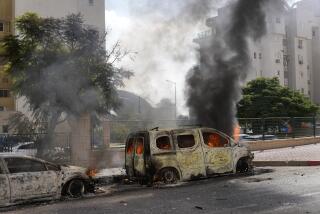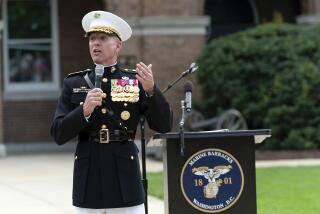Argentine Army Chief Resigns in Wake of Mutiny
- Share via
BUENOS AIRES — Argentina’s army commander, Gen. Jose Dante Caridi, submitted his resignation Tuesday just two weeks after an army mutiny, deepening a serious conflict between the Argentine armed forces and the civilian government.
In return for ending their four-day insurrection in early December, the 500 rebellious officers and troops claimed to have won Caridi’s pledge to step down before Christmas. President Raul Alfonsin insisted at the time that the government had made no deal with the rebels and reiterated his confidence in Caridi, the fourth army chief of staff in five years.
Alfonsin plans to address a special session of Congress today to discuss the civil-military crisis, considered by far the most serious during his tenure.
An army statement Tuesday night said that Caridi had asked to resign, along with the two other most senior army generals, Miguel Abbate and Enrique Bianchi.
Caridi said last Friday that while he opposed the mutineers’ methods, he shares their main goal: an end to persecution of the armed forces for alleged human rights abuses during the “dirty war” against left-wing subversion, waged by the military dictatorship from 1976 until Alfonsin’s election in 1983.
At least 9,000 people were arrested and presumed executed during that period. After democratic rule was restored, civilian courts tried and jailed the five former junta members and several other senior officers for rights abuses. However, further prosecutions were curtailed after army uprisings in April, 1987, and January, 1988.
Local news reports said that Alfonsin will accept Caridi’s resignation and appoint in this place Gen. Francisco Gasino, a staunchly loyalist officer, rather than one of the generals favored by Col. Mohamed Ali Seineldin, who led the latest rebellion.
Gasino’s appointment would signal a hardening of the government’s stance in relations with the military. Alfonsin was criticized for his apparent concessions to the armed forces after the earlier revolt, and he stressed this time that Seineldin had capitulated because of the overwhelming firepower brought to bear against his stronghold, a munitions garrison on the edge of Buenos Aires.
Caridi had also denied any deal between the government and the rebels--acknowledging that he and Seineldin had treated the rebellion as an internal army matter.
Caridi said on Friday that if the government and Argentine society continued to describe the army campaign against subversion as “genocide” and otherwise denigrate the military, further insurrections were likely.
More to Read
Sign up for Essential California
The most important California stories and recommendations in your inbox every morning.
You may occasionally receive promotional content from the Los Angeles Times.













